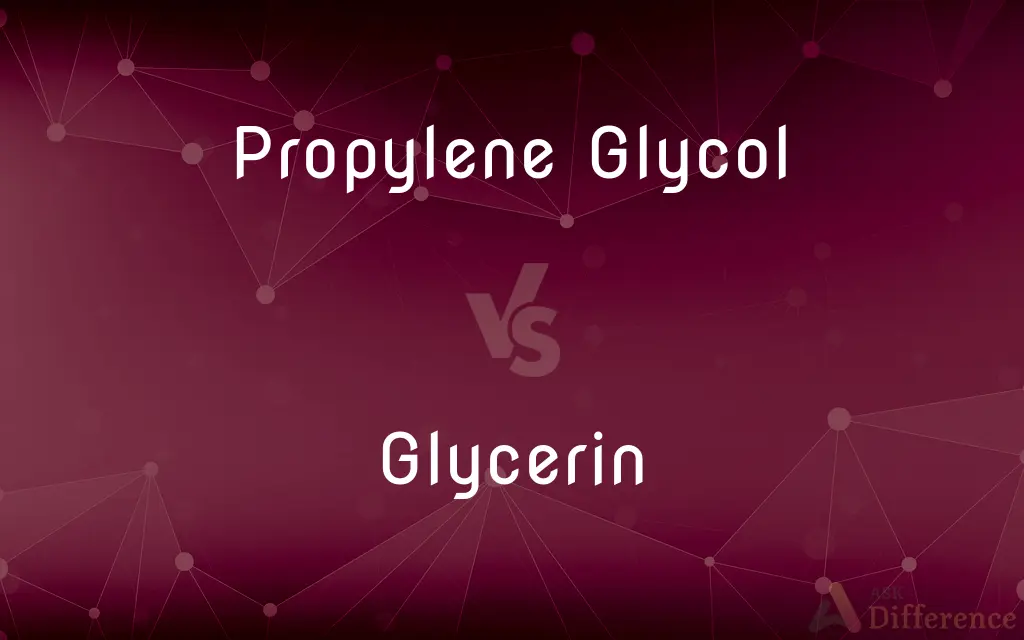Propylene Glycol vs. Glycerin — What's the Difference?
Edited by Tayyaba Rehman — By Fiza Rafique — Published on December 13, 2023
Propylene Glycol is a synthetic liquid used in various products, while Glycerin is a natural, sweet-tasting liquid found in plant and animal fats. Both are used as solvents and humectants.

Difference Between Propylene Glycol and Glycerin
Table of Contents
ADVERTISEMENT
Key Differences
Propylene Glycol and Glycerin, although sometimes used interchangeably in specific applications, are distinct substances with different origins and properties. Propylene Glycol, often found in cosmetics, food, and pharmaceuticals, is a synthetic organic compound. Its primary purpose in these products is to absorb excess water and maintain moisture, thus acting as a humectant. Additionally, due to its miscibility with a wide range of solvents, Propylene Glycol serves as a carrier fluid in hydraulic systems.
Glycerin, on the other hand, is naturally occurring and can be derived from both plant and animal sources. It is a colorless, odorless, viscous liquid that is sweet-tasting and non-toxic. Like Propylene Glycol, Glycerin is a popular ingredient in the cosmetic and food industries. Its natural moisturizing properties make it a common ingredient in skincare products. In foods, it serves as a sweetener, preservative, and thickener.
When it comes to their chemical structures, Propylene Glycol and Glycerin differ. Propylene Glycol is an alcohol with two hydroxyl groups, making it a diol. Glycerin, sometimes referred to as glycerol, has three hydroxyl groups, classifying it as a triol. This structural difference impacts their functionalities in various applications.
Another notable difference is their consistency. While both are clear liquids, Glycerin is more viscous than Propylene Glycol. This characteristic viscosity of Glycerin is one reason it's favored in lotions and creams, giving them a smoother texture.
In vaping, both Propylene Glycol and Glycerin have earned recognition. Propylene Glycol delivers a throat hit similar to that of tobacco, while Glycerin produces thicker clouds of vapor. Thus, many e-liquids are a blend of the two to balance the vaping experience.
ADVERTISEMENT
Comparison Chart
Origin
Synthetic
Natural (Plant and Animal sources)
Chemical Structure
Diol (Two hydroxyl groups)
Triol (Three hydroxyl groups)
Consistency
Less viscous
More viscous
Taste
Slightly bitter
Sweet
Applications in Vaping
Delivers a throat hit
Produces thicker clouds of vapor
Compare with Definitions
Propylene Glycol
A diol often found in food, cosmetics, and antifreeze solutions.
Check the ingredients; some skin creams have Propylene Glycol for added moisture.
Glycerin
A sweet-tasting, viscous liquid derived from plant or animal fats.
The soap contains Glycerin, making it gentle and moisturizing.
Propylene Glycol
A substance used in hydraulic fluids due to its miscibility properties.
The brake fluid consists of Propylene Glycol, ensuring optimal performance.
Glycerin
A common ingredient in cosmetics due to its moisturizing properties.
Glycerin-based lotions deeply hydrate the skin.
Propylene Glycol
A common carrier fluid in vaping products.
Vapers appreciate the throat hit provided by Propylene Glycol in e-liquids.
Glycerin
A triol used in foods as a sweetener and preservative.
Glycerin added to the cake gives it a moist texture.
Propylene Glycol
A synthetic organic compound used as a solvent in many pharmaceuticals.
The cough syrup contains Propylene Glycol to ensure even distribution of active ingredients.
Glycerin
A colorless, odorless substance often used in the pharmaceutical industry.
The ointment has Glycerin, ensuring it's soothing to the skin.
Propylene Glycol
A colorless, odorless liquid that absorbs water.
Propylene Glycol is used in cosmetics to prevent them from drying out.
Glycerin
A component in e-liquids that produces thick vapor clouds.
For cloud chasers, e-juices with higher Glycerin content are preferred.
Glycerin
Glycerol or a preparation of glycerol.
Glycerin
(organic compound) glycerine.
Glycerin
An oily, viscous liquid, C3H5(OH)3, colorless and odorless, and with a hot, sweetish taste, existing in the natural fats and oils as the base, combined with various acids, as oleic, margaric, stearic, and palmitic. It may be obtained by saponification of fats and oils. It is a triatomic alcohol, and hence is also called glycerol. See Note under Gelatin.
Glycerin
A sweet syrupy trihydroxy alcohol obtained by saponification of fats and oils
Common Curiosities
Can Propylene Glycol be ingested?
Yes, Propylene Glycol is considered safe for consumption in regulated amounts.
What is Propylene Glycol commonly used for?
Propylene Glycol is widely used in cosmetics, food, and pharmaceuticals as a solvent and humectant.
Is Glycerin natural or synthetic?
Glycerin is natural and can be derived from both plant and animal sources.
Is Propylene Glycol harmful when vaped?
When vaped at recommended levels, Propylene Glycol is generally considered safe, but some people may be sensitive to it.
Why is Glycerin added to skincare products?
Glycerin is added for its natural moisturizing properties, making skin soft and hydrated.
What is the main difference in their chemical structure?
Propylene Glycol is a diol with two hydroxyl groups, while Glycerin is a triol with three hydroxyl groups.
Are there any common side effects from consuming too much Glycerin?
Excessive consumption of Glycerin can lead to digestive upset, including diarrhea.
What is the taste difference between Propylene Glycol and Glycerin?
Propylene Glycol can have a slightly bitter taste, whereas Glycerin is sweet-tasting.
Can Propylene Glycol and Glycerin be used together in products?
Yes, they are often used together in various products, including e-liquids.
Are there any allergic reactions associated with Propylene Glycol?
Some individuals might have skin irritations or other allergic reactions to Propylene Glycol, but it's rare.
Why is Glycerin often found in soaps?
Glycerin helps retain moisture, making soaps more hydrating for the skin.
Which one produces thicker clouds in vaping, Propylene Glycol or Glycerin?
Glycerin produces thicker clouds compared to Propylene Glycol.
Can Glycerin be used as a sweetener in foods?
Yes, Glycerin is sweet-tasting and is often used as a sweetener in foods.
Which one, Propylene Glycol or Glycerin, is more viscous?
Glycerin is more viscous than Propylene Glycol.
In which product can I commonly find both Propylene Glycol and Glycerin?
Both are frequently found in e-liquids used for vaping.
Share Your Discovery

Previous Comparison
Kickboxing vs. MMA
Next Comparison
Oxygenic Photosynthesis vs. Anoxygenic PhotosynthesisAuthor Spotlight
Written by
Fiza RafiqueFiza Rafique is a skilled content writer at AskDifference.com, where she meticulously refines and enhances written pieces. Drawing from her vast editorial expertise, Fiza ensures clarity, accuracy, and precision in every article. Passionate about language, she continually seeks to elevate the quality of content for readers worldwide.
Edited by
Tayyaba RehmanTayyaba Rehman is a distinguished writer, currently serving as a primary contributor to askdifference.com. As a researcher in semantics and etymology, Tayyaba's passion for the complexity of languages and their distinctions has found a perfect home on the platform. Tayyaba delves into the intricacies of language, distinguishing between commonly confused words and phrases, thereby providing clarity for readers worldwide.
















































